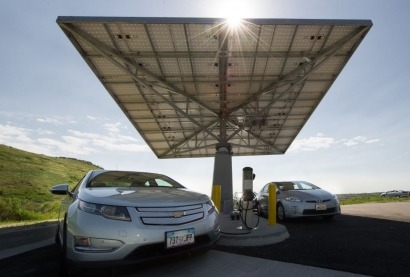
The Factbook reports 2016 set a new record for annual renewable energy capacity additions, as the U.S. added 22GW of renewable generating capacity. Over half of these additions – 12.5GW – were from the solar industry.
The year also saw greenhouse gas emissions in the U.S. fall to their lowest level in 25 years. At the same time, Americans dedicated a smaller share of their household income to electricity and natural gas bills than at any other time on record.
Consumers devoted less than 4% of their total annual household spending to energy in 2016. Falling costs for gasoline, natural gas, and electricity, along with energy efficiency measures, have contributed to this trend.
The report shows the economy continues to grow while the country transitions to cleaner energy resources.
The transportation sector has not been transitioning as quickly as the electricity sector with sales of Hybrid Electric Vehicles (HEV’s) plummeting 10% in 2016. This is due in part to continued low oil prices. Electric Vehicles (EVs) did see an increase of 38%, however that only accounts for a little over 1% of total vehicle sales.
Key federal policies supportive of sustainable energy hit stumbling blocks in 2016, while state-level actions continued. Along with state-sponsored initiatives, corporate investments are expected to play an important role in expanding the U.S. renewable energy market in the coming year.
“The contributions of sustainable energy to the country’s economic competitiveness are direct, dramatic and dynamic,” said Lisa Jacobson, president of BCSE, in a statement. “The trend lines in the 2017 Factbook are clear: Energy efficiency, natural gas and renewable energy are benefiting American consumers, American businesses and American manufacturers. And that adds up to one conclusion: clean energy wins for America.”
For additional information:

